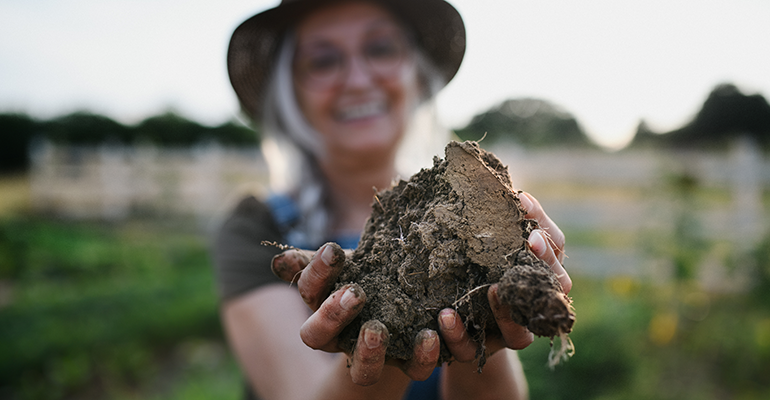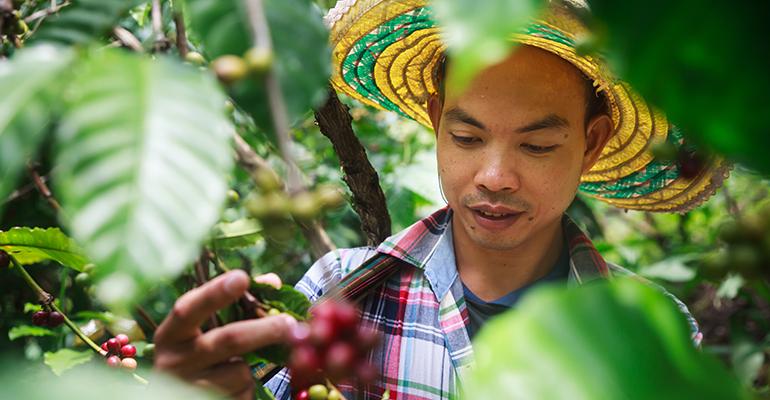News
Making coffee farming more sustainable
26 Oct 2022
Interest in a circular economy model is increasing among coffee players as calls for positive environmental action proliferate the supply chain.
“Our agricultural system needs an urgent overhaul,” Miguel Gamboa, coffee sector lead at international non-profit organisation, Rainforest Alliance told Ingredients Network.

In June 2022, the UK’s Department for Environment, Food and Rural Affairs (Defra) announced the publication of its recent consultation outcome. The consultation surrounded the implementation of due diligence provisions in the Environment Act 2021 through secondary legislation to combat illegal deforestation in UK supply chains.
“The coffee industry has been well aware for some time of the need to increase sustainability and indeed the benefits which come from that,” says Paul Rooke, executive director of the British Coffee Association (BCA).
Bringing forward legislation such as that concerning forest risk commodities, including coffee, gives the industry an “opportunity to highlight the benefits that production techniques such as shade coffee bring to tackling deforestation and indeed focus on reforestation”, he says.
Pursuing sustainability in coffee production
Transitioning to regenerative agriculture is high on the agenda. Regenerative agriculture has strong roots in Indigenous farming practices, says Gamboa. While sustainable agriculture seeks to lower the detriment of conventional methods, such as using harmful agrochemicals on land, regenerative agriculture progresses beyond a harm-reduction approach to restore ecosystems and add to nature.
“Creating a more sustainable system is a journey and the destination should be regenerative agriculture,” he adds. Mapping risks, such as impacts of climate change and biodiversity loss, can enable farmers to make decisions supporting their transition to a more regenerative production system.
According to Gamboa, coffee farming can present both risks and opportunities for biodiversity conservation. Agroforestry techniques can protect biodiversity by planting shade trees, increasing soil fertility and health and improving carbon sequestration. These techniques can increase crop resistance to pests and diseases, promoting more robust yields and lowering the need for external inputs like pesticides.
Delivering best-practice agronomic outreach is undertaken via individual businesses or third-party coffee operations such as Global Coffee Platform. The World Coffee Research, for example, focuses on varietal development through plant breeding and bringing enhanced varieties to producing countries for evaluation.
Projects are also exploring water usage, specifically how processing mills can reduce or increase the level of water recycling. Simultaneously, there is growing interest in how waste material from coffee processing, like coffee pulp and husks, might be used as fertiliser, soil nutrients or renewable energy sources.
“Coffee is a sustainable product and has the opportunity to go beyond net zero and become a net positive commodity for carbon with the potential for innovation to allow producers to be able to financially benefit from their ability to take in carbon,” says Rooke. The industry is also exploring how the coffee-producing sector might increase its ability to capture and store carbon in soils acting as an overall carbon sink.
 © AdobeStock/Bluesky60
© AdobeStock/Bluesky60
Coffee commitments
Global coffee name Nestlé has launched a new initiative to help coffee farmers transition to regenerative agriculture. Through its initiative, Nestlé Plan 2030, the coffee producer aims to work with farmers to obtain 100% responsibly sourced coffee by 2025. Nestlé also sets out to source 20% of coffee from regenerative agricultural methods by 2025 and 50% by 2030.
The Rainforest Alliance and Nespresso have developed the Regenerative Coffee Scorecard — a voluntary tool to help coffee companies move to regenerative farming. It identifies farmers’ current performance and tracks improvement towards regenerative goals.
Swiss supermarket chain Migros set its sights on changing how we make coffee at home to reduce the amount of aluminium and plastic capsules in landfills. The company has launched its CoffeeB system, which uses automation to provide capsule-less coffee, removing the need to dispose of or recycle capsules.
Changing the coffee production of tomorrow
By focusing on environmental, economic and social sustainability, the industry will see opportunities for improving access to digitalisation at the producer level. In turn, this allows producers “much greater access to agronomy advice, to greater market information return and to services which will improve the efficiencies within the supply chain”, Rooke says.
Improving the overall research and development (R&D) input, particularly in plant genetics, will help enable producers to evaluate new varieties. The approach can create increased yield and positive sustainability factors such as improved water use efficiency, increased nutrient uptake and greater natural protection against pests and disease.
Collaboration is integral to achieving sustainability ambitions in the coffee industry. “Scaling regenerative agriculture in the coffee sector should not fall on the shoulders of farmers alone — it will take a joint effort from actors across the supply chain,” says Gamboa.
Related news

Oat Barista: Innovation for game-changing beverages
20 Nov 2025
Oat Barista is a clean label, sustainable, and innovative drink base specifically designed to create the perfect foam in one single ingredient.
Read more
How younger consumers are redefining ingredient choices and rejecting brand loyalty
18 Nov 2025
Gen Z and millennial consumers’ preferences for transparency, functionality, and purpose are “redefining the very nature of consumption itself”, says SPINS.
Read more
Hybrid formats and flexible positioning to disrupt category norms in 2026
17 Nov 2025
Trend forecasters expect food and drink to move more fluidly across occasions, functions, and formats as consumers seek versatility, novelty, and convenience.
Read more
Danone highlights digestive health as potential ‘tipping point’ for food industry
13 Nov 2025
Danone is betting on a food industry “tipping point” that will bloat the market for healthy products, particularly those related to gut health.
Read more
New UPF standard hoped to offer consumers ‘coherence and clarity’
10 Nov 2025
Ingredients companies are being urged to enter “a new era of partnership and innovation” following the launch of the industry’s first non-UPF verification scheme.
Read more
Faravelli at Fi Europe: Showcasing FARA® functional solutions for food and nutra
28 Oct 2025
At Fi Europe 2025 in Paris (stand 72M39), Faravelli showcases FARA® Customized Functional Solutions and a wide ingredient portfolio for food and nutra – delivering quality, innovation, and expertise.
Read more
Agrigum Redefined FIBER
27 Oct 2025
Agrigum has transformed gum acacia into a natural, science-backed fibre that supports gut health, sustainability, and innovation across global food and nutrition applications.
Read more
Expanding boundaries in food & beverage innovation
23 Oct 2025
IMCD and FrieslandCampina Professional expand partnership to deliver Kievit® across EMEA, enabling brands to enhance quality and accelerate time-to-market for tomorrow’s food & beverage creations.
Read more
Amazon Grocery launch aims to balance quality with affordability
22 Oct 2025
Global e-commerce giant Amazon has introduced a new private-label food brand, combining existing Amazon Fresh and Happy Belly products with new everyday items.
Read more
Powerade enters hydration space with launch of Power Water
21 Oct 2025
Coca-Cola’s Powerade brand has launched a zero-sugar, electrolyte-enhanced functional water, marking the brand's entry into the hydration space.
Read more